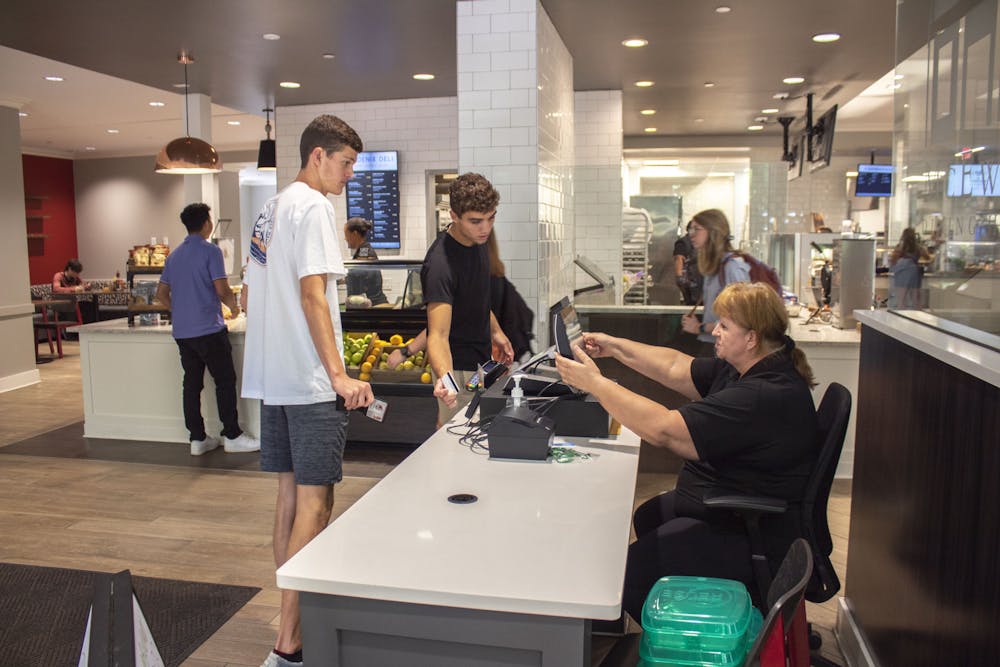For sophomore Caroline Baulig, the additional and often mandatory purchase of a meal plan makes the timely convenience of dining halls a monetary inconvenience.
Baulig wanted to purchase a 300 Block plan this upcoming year, but because she lives in a Colonnades Neighborhood residence hall, she is required to purchase at least the All Access Basic Meal Plan. Despite having unlimited access to the dining halls, Baulig said she feels limited by Elon’s meal plans.
She also said she wishes meal plan options were more tailorable — allowing more opportunities to cook, eat at on-campus retail locations or eat meals off campus with her friends.
“I didn't realize that where I lived hindered my ability to choose what meal plan I was getting,” Baulig said. “I wish there were less constraining options — being able to be flexible and customize a meal plan … that would be a good option.”
Baulig’s frustration is compounded by the rising cost of all meal plan options. The class of 2026 who purchased a meal plan this year paid 9.4% more than the class of 2023 three years ago, according to pricing information on Elon Dining’s website.
According to Elon’s Assistant Vice President for News and Information Owen Covington, this accounts for rising inflation rates and food costs and higher wages for those in the dining industry, including dining hall and restaurant workers, and Elon works with Harvest Table to limit the impact of inflation on students and their families. Covington said Elon has seen an increase in meal plan rates of between 3% and 4% for four of the past five years, including the 2022-23 academic year — a percent change lower than the June 2022 annual inflation rate of 9.1%.
Elon has a two-year on-campus residency requirement for all students unless given an exemption from Residence Life. The two-year requirement to live on campus also comes with a two-year requirement to eat on campus.
Covington wrote in a statement to Elon News Network that these requirements give students a residential campus experience — a foundation of the overall Elon experience.
“Being a residential campus means that students’ intellectual and personal development are woven seamlessly into the classroom and residential environments, including dining facilities,” Covington wrote. “University programs and facilities are designed to meet the developmental needs of students as they progress through their four years at Elon.”
In dining halls, students are given access to a variety of stations that can cater to different dietary needs and restrictions. According to the Elon Dining Website, dining hall meals are made with “responsibly sourced” ingredients, 20% of which are grown, harvested or produced within 150 miles of campus and contain no “artificial ingredients, additives or synthetic chemicals.” Additionally, all students who are on a meal plan have a minimum of $150 annual food dollars they can spend at on-campus retail locations.
According to the nonprofit education news outlet The Hechinger Report, the cost of groceries for a college student averages at $260 per month, or $3.10 per meal. The report also highlights that the cost of eating out as a college student averages $342 per month and a campus meal plan averages $563 per month. Students may also have to factor in other expenses such as gas and kitchen supplies into their overall grocery budget.
For other students like junior Nolan Schreiner, the cost alone made purchasing a dining plan not worth it, even with the additional factors that go in to grocery shopping. Schreiner, who currently lives in an on-campus apartment, decided to not purchase a meal plan after calculating each meal on the Block 300 Plan is worth roughly $14.50.
“I could make a meal for less money, so why would I be paying $14.50 to have a set number of meals?” Schreiner said. “To me, it just made no sense.”
Schreiner said without a meal plan, he chooses to cook his meals at home or go out to eat. Baulig, however, does not have that convenience.
“I basically have to spend all of my time eating on campus in the dining halls, which isn’t exactly my favorite,” Baulig said. “Especially since most of my friends probably won’t be going to the dining halls.”


